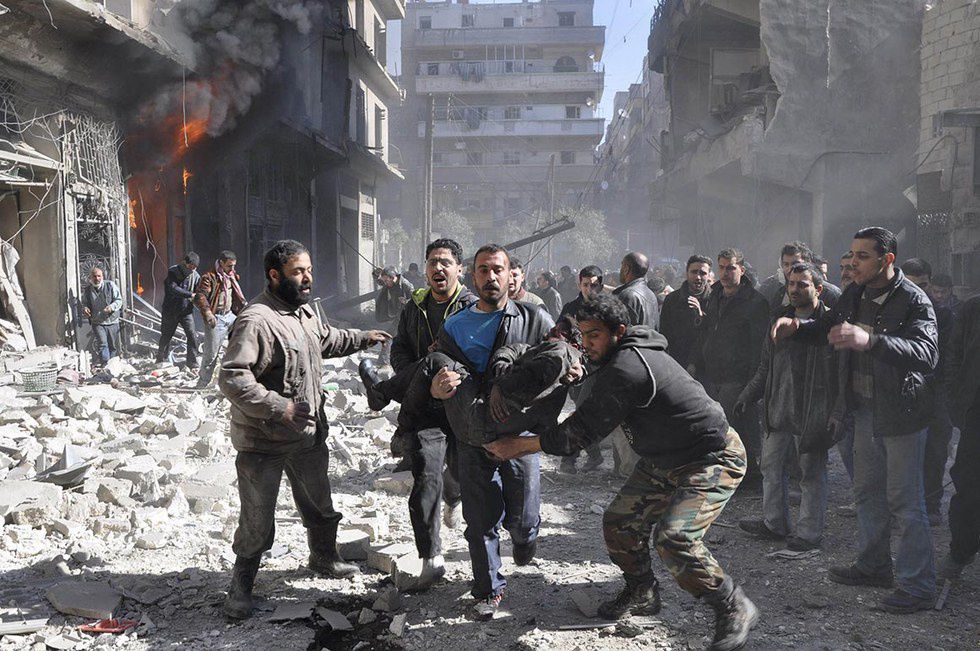Everybody knows about the Arab spring in places like Egypt because they all followed the same formula: people are unhappy with a leader who has violated their rights, the leader fights back with force, but the rebels ultimately force the leader to step down. What about Syria, though? We keep hearing about refugees and terrorists, but it’s hard to put together a clear picture of what exactly is happening over there. This is a guide to simplify and explain for you what exactly is happening in the Middle East.
Since 1971, the Al-Assad family has ruled Syria, however people are calling for them to step down. The whole situation began with some some teenage boys that were accused of graffiting a wall with sentiments against the president of Syria, Bashar Al-Assad. The subsequent imprisonment and mistreatment of the boys lead to pro- democracy protests, which were met with force. Suddenly there were protests all over Syria calling for Assad to step down from power, and these protests were met by Al-Assad’s army, who crushed them with violence. The protesters reacted by arming themselves to reclaim their towns; these armed protesters turned into the Free Syrian Army, or FSA. Both of these sides have been accused by the UN of committing war crimes, including using chemical weapons against civilians.
Recommended for you
For a while it was as simple as rebels fighting to remove their leader, but then things got complicated. A terrorist group officially named the Islamic State but colloquially referred to as ISIS stepped in. ISIS is distinct from other terrorist groups such as Al Qaeda in that their end goal is much different. As opposed to Al Qaeda, whose goal was to take down Western powers for mostly political reasons, ISIS is looking to established a caliphate, or a single Islamic state that is ruled by one leader. The political unrest and divide in Syria made for an extremely vulnerable country- a country that could not efficiently resist an attempted takeover. Thus, ISIS joined the fight using violent acts against civilians to claim territory. Neither side in Syria likes this.
As if the conflict wasn’t complicated enough, more countries got involved. The US, the UK, and France among others are training the FSA and carrying out airstrikes against Al-Assad, who is being assisted by Iran and Russia. The addition of these countries is referred to as the proxy war -- they’re using the Syrian war to take out their aggression toward each other.
So what about the refugee crisis that we keep hearing about? All of this fighting and violence is happening in cities and towns where people are trying to raise families. They essentially have three choices, to choose a side and fight, risking death, to stay put and risk abuse at the hands of ISIS or death via airstrike, or to flee and attempt to live a higher quality of life. If you’re raising a family only one option makes sense, so people fled. For a while they went to different countries in Europe and the middle East, however the terrorists caught wind of how welcoming the other countries were and used this to their advantage. When the recent terrorist attacks in Europe were traced back to people who had snuck into the respective countries as Syrian refugees, other countries were much more hesitant to open themselves up.
After all of this mess here’s what we’re left with: The US, Turkey, the UK, France and other gulf countries backing the Free Syrian Army of rebels in a fight against President Bashar Al-Assad, Iraq and Russia. All of these people I just listed are also fighting ISIS who, by trying to conquer Syria as well as other Arab countries, are trying to make a single Islamic state. All of this fighting has left nearly half of Syria’s population either displaced within the country or fleeing as refugees. Other countries now have a huge humanitarian question to answer: Is letting the refugees in worth the risk of also allowing a potential terrorist to slip through the cracks? There are no imminent solutions for any of these problems, and nobody knows how it will end. Only time will tell.








 man running in forestPhoto by
man running in forestPhoto by 





 "I thought you knew what you signed up for."
"I thought you knew what you signed up for." man and woman in bathtub
Photo by
man and woman in bathtub
Photo by  four women sitting on black steel bench during daytime
Photo by
four women sitting on black steel bench during daytime
Photo by  Uber app ready to ride on a smartphone.
Photo by
Uber app ready to ride on a smartphone.
Photo by  woman in red tank top and blue denim shorts standing beside woman in black tank top
Photo by
woman in red tank top and blue denim shorts standing beside woman in black tank top
Photo by  blue marker on white printer paper
Photo by
blue marker on white printer paper
Photo by  welcome signage on focus photography
Photo by
welcome signage on focus photography
Photo by  woman in white and black striped long sleeve shirt lying on bed
Photo by
woman in white and black striped long sleeve shirt lying on bed
Photo by  pink pig coin bank on brown wooden table
Photo by
pink pig coin bank on brown wooden table
Photo by  person holding iPhone 6 turned on
Photo by
person holding iPhone 6 turned on
Photo by  person holding pencil near laptop computer
Photo by
person holding pencil near laptop computer
Photo by  person slicing vegetable
Photo by
person slicing vegetable
Photo by 
 woman covering mouth with sweater
Photo by
woman covering mouth with sweater
Photo by  person holding remote pointing at TV
Photo by
person holding remote pointing at TV
Photo by  a woman with her arms raised in a crowd of people
Photo by
a woman with her arms raised in a crowd of people
Photo by  "Shocked disbelief: '95% of the population is undateable?'"
"Shocked disbelief: '95% of the population is undateable?'"








